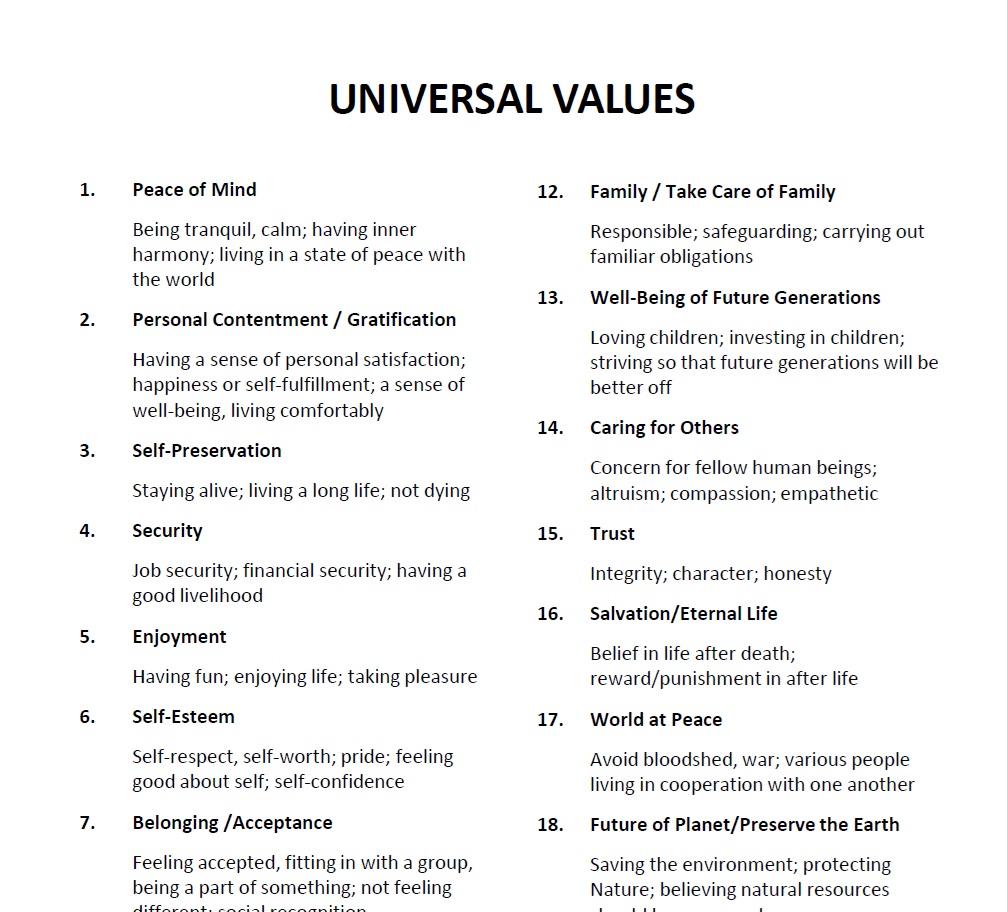Experts believe there are universal values which all people adhere to, no matter their gender, race or culture. The problem of course is finding universal agreement on what goes in the list.
Of all the lists of universal values, I keep returning to the list below, given to me by former colleagues of Wirthlin International (now part of Harris Interactive). It’s singular benefit to me is its conciseness, organised and sorted into 22 values.
Universal Values
Sir Isaiah Berlin defined universal values as …
“Values that a great many human beings in the vast majority of places and situations, at almost all times, do in fact hold in common, whether consciously and explicitly or as expressed in their behaviour.”
1. Accomplishment
Achievements, meeting goals, competence that shows results
2. Belonging and Acceptance
Feeling accepted, fitting in with a group, being a part of something, not feeling different, social recognition
3. Concern for Others
Concern for fellow human beings, altruism, compassion, empathy
4. Control
Having power, being able to make the decisions
5. Enjoyment
Having fun, enjoying life, taking pleasure
6. Equality and Brotherhood
Equal opportunity for all, egalitarian
7. Family (Taking Care of)
Responsibility, safeguarding, carrying out familiar obligations
8. Freedom
Being free to make choices, independence, autonomy
9. Future of Planet / Preserve the Earth
Saving the environment, protecting nature, believing natural resources should be preserved
10. National Security
Patriotism, loyalty to country, behaving as a good citizen
11. Peace of Mind
Being tranquil, calm, having inner harmony, living in a state of peace with the world
12. Personal Contentment / Gratification
Having a sense of personal satisfaction, happiness or self-fulfillment, a sense of well-being, living comfortably
13. Respect for Life
Belief in sanctity of all forms of life
14. Salvation / Eternal Life
Belief in life after death, reward / punishment in after life
15. Security
Job security, financial security, having a good livelihood
16. Self-Esteem
Self-respect, self-worth, pride, feeling good about self, self-confidence
17. Self-Preservation
Staying alive, living a long life, not dying
18. True Friendship
Closeness, companionship
19. Trust
Integrity, character, honesty
20. Well-Being of Future / Generations
Loving children, investing in children, striving so that future generations will be better off
21. Wisdom and Understanding
Being mature, having insight, a broad perspective, self-knowledge and knowledge of others
22. World at Peace
Avoiding bloodshed and war, varied people living in cooperation with one another
If it’s helpful, this is the last in a series of articles on Defining the Target Audience, starting here with Demographics vs Psychographics.
How have you used Universal Values in your programs? Please add any thoughts and comments below.



2 Comments
I REALLY appreciate all the loving care you put into assembling this free resource to the public community, Andy – thank you!
However number 14 is NOT a Universal Value, sorry.
14. Salvation / Eternal Life – Belief in life after death, reward / punishment in after life
Thanks for posting your comment. We had a good email exchange over this topic. Much of the issue with this value specifically – not just from Professor Loewy, but others too – depends upon how religious you are. (Not to say either of us are or are not.) For people who do believe in a higher power, they might use the value of Eternal Life to help them make a decision. For example, someone in a recent workshop said they had tapped into this value as they were writing their will. My wonderful 91-year-old mother uses the value to make important decisions in her life as well. You may or may not use the value for yourself, but the point of the list is that it simply maps out all of the potential values a consumer might use to make an important decision. And, like all values and all audiences, you never assume. Let the audience tell you. When they do, don’t JAB them – judge, assume or use bias against them. It’s their choice.